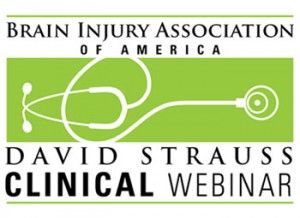2023.07.26 – Supporting Participation for Older Adults Experiencing Brain Injury (Recorded Webinar)
A David Strauss Memorial Clinical Lecture recorded webinar featuring Emily Nalder, Ph.D. and Shlomit Rotenberg, Ph.D.
To download the webinar, choose the “Download Now” option from the dropdown below. After completing the checkout process, you will receive an email with further instructions and a file that includes information about receiving your ACBIS CEU.
Aired live on July 26, 2023. Includes 1 ACBIS CEU.
Note: A certificate of attendance/ACBIS CEU certificate will not be available with the purchase of this webinar after July 31, 2026.
In this David Strauss Clinical webinar, Emily Nalder, Ph.D., and Shlomit Rotenberg, Ph.D. discuss personal and environmental factors shaping how people engage in meaningful activities in later life and how that intersects with brain injury. They describe current literature on self-management in aging and strategies to improve activity participation in older adults. They also discuss results from a recent randomized controlled trial on metacognitive intervention for older adults with memory problems.
Learning Objectives:
- Describe the age-related environmental and personal factors influencing activity participation after brain injury.
- Identify principles of self-management in aging.
- Discuss strategies to improve activity participation and self-management goals in older adults.
Includes 1 ACBIS CEU.
Speaker Bios
Emily Nalder, Ph.D., is an Assistant Professor in the Department of Occupational Science & Occupational Therapy at the University of Toronto. She holds a Canada Research Chair (Tier 2) in Resiliency and Rehabilitation and is a registered occupational therapist in Ontario, Canada. From 2015-2021 Dr. Nalder held the March of Dimes Canada Paul J. J. Martin Early Career Professorship focused on community integration and acquired brain injury. Her research explores issues of integration into the community following injury, acquired brain injury in particular, and how to optimize service delivery in ways that will enable individuals to engage in the activities they need and want to do. This includes examining resiliency processes (how individuals adapt to life challenges), intervention approaches that enable engagement in activity, and how technology can be harnessed in delivering rehabilitation services.
Shlomit Rotenberg, Ph.D., is an Assistant Professor in the Department of Occupational Science & Occupational Therapy at the University of Toronto. She was trained as an occupational therapist at the Hebrew University, Jerusalem, Israel, where she also received her Ph.D. in 2017. Dr. Rotenberg worked as an occupational therapist for 10 years in an interdisciplinary geriatric clinic and community-based rehabilitation unit, working with adults and older adults with cognitive impairments. Her research aims to enable autonomy, community engagement, and continued participation in meaningful occupations of older adults. Her research focuses on understanding how cognitive impairments arising from aging and/or neurological conditions affect engagement in everyday life and developing and evaluating interventions to promote occupational engagement, health, and well-being of older adults.


